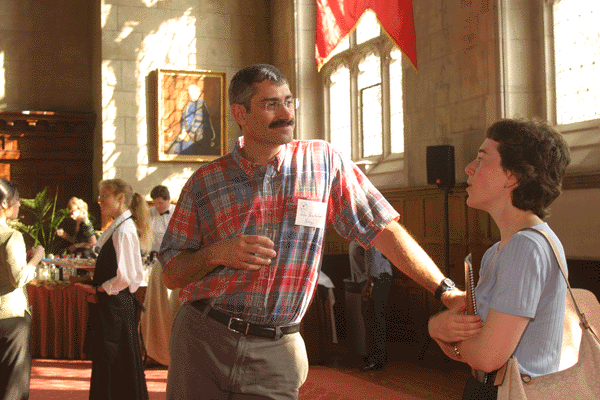A professor who likes leeches, despite the yuck factor.
By Sydney Espinosa
At Bryn Mawr College, deep within the infamous labyrinth of the Park Science building, a modern-day beast master tames his minions, looking on as his creatures vainly wriggle about in their watery prison.
Dr. Peter Brodfuehrer, a professor of Biology at Bryn Mawr, is this mustachioed Poseidon; and his mighty Leviathan? Leeches.
“It’s a versatile beast,” said Brodfuehrer. “It’s a hardy preparation that people can manipulate and look at different aspects of it, even when manipulations are pretty gross.”
He has been studying the nervous system of the leech—exploring how its neurons make it swim—since attending graduate school at the University of Virginia.
Yet, Brodfuehrer admits that the leech love ran cold while he was a Post Doc at Cornell University, but after coming to Bryn Mawr College in 1981, he rekindled his love with leeches and has never looked back.
 “I decided to go back to the leech because there were some unanswered questions that came out of my thesis work that I didn’t pursue because I had finished the original,” he said, “but there was data that said here is another question or line of investigation.”
“I decided to go back to the leech because there were some unanswered questions that came out of my thesis work that I didn’t pursue because I had finished the original,” he said, “but there was data that said here is another question or line of investigation.”
But what does Brodfuehrer find so important about a leech swimming around in a bucket?
His latest research looks at the neuron’s glutamate receptors, which are important in the leech’s nervous system for sending the specific signals for swimming through the nervous system. Glutamate is essential in almost all animals, including humans, for sending signals required for muscle movement.
“Rhythmic behaviors, for example, like swimming, walking, flying, things like that, most of them are episodic behaviors,” he explained. “They start, they go for a while, and then they stop…How do you actually turn on these behaviors? What are the neural mechanisms?”
While the research may not sound blockbuster exciting, his findings in leeches are surprisingly similar to what others have found in humans.
“There are a set of general principles that apply to how you get any system to produce any rhythmic behavior,” he explained, “like, how do you walk? What neural circuits allow you to alternate the movement of your legs? That’s a rhythmic motor pattern.”
When he is not experimenting with leeches, Brodfuehrer is engaging in another passion: teaching. Yet, developing a career as an educator was never a lifelong goal, but rather it was something that he fell into.
“I’d never thought about [teaching], until I was knee-deep in it, that this would be a career,” he said.
He discussed his early experience teaching while at Cornell. He described how working with faculty who did more research than actual instructing really inspired him to look for something different and to pursue a job at a smaller liberal arts institution.
“Although I really liked doing research, I enjoyed teaching,” he said, “and I thought I would want to do it more than two weeks a year.
Now, with Professor Earl Thomas of the Psychology department, Brodfuehrer co-instructs “Channels to Behavior,” a lab course designed to give undergraduates hands-on experience with advanced experimental procedures that are commonly used in neural and behavioral sciences.
“When I was an undergraduate I loved tinkering in the lab,” he said. “Doing these neuro-recordings that you see in textbooks, and manipulating the activity of neurons to see if it affects other cells in the system, I found it interesting.”
According to Brodfuehrer, the course provides a truly unique opportunity to attain a skill set that is incredibly valuable when it comes to applying for graduate school and jobs. It is very rare for undergraduates to even be exposed to such sophisticated techniques, let alone be expected to perform them.
“They are a good set of skills to have, even if you don’t want to do research in the lab,” he said, “they are fairly high-powered techniques, people use them all over the place. If you have those skills, you can get a job.”
Despite everything else, there is still the million-dollar question: why leeches?
Brodfuehrer provides a couple of reasons as to why he has stayed loyal to these masses of slime that most would not want to be near, forget touch and dissect. For him, it comes down to his responsibility to his students.
“Just thinking about trying to incorporate the time commitment of doing physiology with the other responsibilities of my job and the other, having students be in the lab,” he explained, “you can do an experiment with a leech that takes you anywhere from one to two hours, so the time frame you have to do things fits more into breaking up your schedule around other things you do, which is an advantage.”
So, while Brodfuehrer’s love for leeches appears exclusive, it seems that it is his students and passion to teach that actually keep them together.
